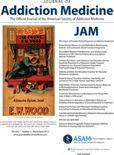
Journal of Addiction Medicine
Scope & Guideline
Unveiling Breakthroughs in Addiction Studies
Introduction
Aims and Scopes
- Substance Use Disorders and Treatment:
The journal publishes studies on various substance use disorders including alcohol, opioids, stimulants, and emerging substances. It emphasizes the effectiveness of pharmacological and non-pharmacological treatments, including medication-assisted treatment (MAT) and behavioral interventions. - Epidemiology and Public Health:
Research examining the prevalence, risk factors, and public health implications of substance use disorders is a key focus. This includes studies on trends in substance use, overdose rates, and the impact of socio-economic factors on addiction. - Harm Reduction Strategies:
The journal supports the dissemination of research on harm reduction approaches, such as safe injection sites, naloxone distribution, and education on safer substance use practices. - Policy Analysis and Health Systems:
Analysis of policies affecting addiction treatment access, insurance coverage, and health care systems is a consistent theme. The journal seeks to inform policymakers and healthcare providers about best practices and areas for improvement. - Special Populations:
Research focusing on specific populations, including women, veterans, adolescents, and marginalized communities, is highlighted to understand unique challenges and treatment needs. - Mental Health and Co-occurring Disorders:
The intersection of mental health issues and substance use disorders is a critical area of exploration, highlighting the need for integrated treatment approaches.
Trending and Emerging
- Telehealth and Remote Care:
With the rise of telemedicine, especially during the COVID-19 pandemic, there has been a significant increase in research exploring the effectiveness and implementation of remote care strategies for addiction treatment. - Polysubstance Use and Its Implications:
Research focused on the co-use of multiple substances, particularly in the context of the opioid crisis and the emergence of synthetic drugs, has gained prominence, highlighting the complexity of treatment strategies required. - Social Determinants of Health:
There is a growing emphasis on understanding how social determinants, such as housing, employment, and education, affect substance use and treatment outcomes, leading to more comprehensive care models. - Integration of Mental Health with Addiction Treatment:
The integration of mental health services with addiction treatment has become a critical area of focus, recognizing the comorbidity of mental health disorders and substance use. - Innovative Harm Reduction Techniques:
Emerging harm reduction strategies, such as supervised consumption sites and the distribution of fentanyl test strips, are increasingly being researched and discussed, reflecting a shift towards more progressive approaches to addiction care. - Research on Emerging Substances:
Increased research on new psychoactive substances (NPS), such as kratom and synthetic cannabinoids, is becoming more common as these substances present unique challenges in treatment and public health.
Declining or Waning
- Traditional Substance Use Treatment Models:
There is a noticeable decline in research focused solely on traditional treatment models without considering integrated or holistic approaches. The shift towards comprehensive care that includes mental health and social determinants of health has overshadowed these older models. - Stigmatization of Substance Use:
While stigma remains a relevant topic, the frequency of studies solely focused on stigma without practical solutions or interventions has decreased. The journal now emphasizes actionable strategies to reduce stigma in clinical settings. - Alcohol Use and Dependency Research:
Research specifically targeting alcohol dependency has seen a reduction in volume compared to opioid and polysubstance use studies, possibly due to the growing urgency surrounding the opioid crisis and emerging substances. - Clinical Guidelines Without Empirical Support:
There has been a waning interest in publishing clinical guidelines or recommendations that lack robust empirical evidence. The journal has moved towards prioritizing studies with strong methodological backing. - Isolated Case Studies:
The prevalence of isolated case studies without broader implications or connections to larger trends in addiction medicine has decreased, as the journal seeks to publish studies that contribute to generalizable knowledge.
Similar Journals
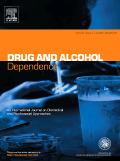
DRUG AND ALCOHOL DEPENDENCE
Pioneering research in drug and alcohol dependence.Drug and Alcohol Dependence is a premier journal published by Elsevier Ireland Ltd, dedicated to the rigorous exploration and analysis of substance use disorders, including drug and alcohol dependencies. With its established history since 1975 and a remarkable convergence of research extending to 2024, the journal holds a prestigious position within the academic community, evidenced by its Q1 ranking in multiple categories, including Pharmacology, Psychiatry and Mental Health, and Toxicology for 2023. It ranks impressively among its peers, underscored by Scopus rankings of #46, #99, and #27 in key fields related to medical pharmacology and toxicology. As a non-open access title, it caters to a global readership of researchers, professionals, and students, providing them with peer-reviewed insights into critical developments and innovative methodologies in the field. The journal’s commitment to advancing knowledge and understanding of drug and alcohol dependence is essential for addressing the global challenges posed by substance use, making it a valuable resource for all stakeholders in public health and clinical practice.
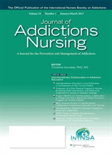
Journal of Addictions Nursing
Innovating Approaches in Addictions NursingThe Journal of Addictions Nursing, published by Lippincott Williams & Wilkins, serves as a pivotal resource in the field of psychiatric and mental health nursing. With an ISSN of 1088-4602 and an E-ISSN of 1548-7148, this esteemed journal has been dedicated to advancing the knowledge and practice of addiction nursing since its inception in 1989. As of 2023, it ranks in the Q3 category of psychiatry and mental health, highlighting its significance amidst its peers. The journal provides a platform for the dissemination of original research, reviews, and clinical practices that address the complexities of addiction treatment and care. While it currently does not offer open access options, its valuable insights are accessible to practitioners and researchers committed to improving patient outcomes. With content spanning from 1989 to 2024, the journal continues to shape the discourse in this vital area of nursing, making it an essential read for professionals and scholars aiming to stay at the forefront of addiction nursing and intervention strategies.

Current Addiction Reports
Elevating addiction research to new heights.Current Addiction Reports, published by SPRINGERNATURE, is a leading journal dedicated to the comprehensive study of addiction in its various dimensions, with a particular focus on the latest clinical developments and research in Clinical Psychology and Psychiatry and Mental Health. Since its inception in 2014 and through to 2024, the journal has established itself as a pivotal resource for researchers, professionals, and students alike, currently holding a prestigious Q1 ranking in both relevant categories. With an impressive Scopus rank of #46 in Clinical Psychology and #129 in Psychiatry and Mental Health, it occupies a significant position within the field, reflecting its commitment to high-quality scholarship and impactful findings. The journal offers open access options, ensuring that vital research is readily available to a global audience. By fostering a deeper understanding of addiction trends and innovative treatment methodologies, Current Addiction Reports plays an essential role in advancing knowledge and improving clinical practices.
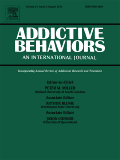
ADDICTIVE BEHAVIORS
Bridging Research and Practice in Addiction StudiesADDICTIVE BEHAVIORS is a prestigious journal published by PERGAMON-ELSEVIER SCIENCE LTD, specializing in the critical examination and exploration of addiction-related issues across diverse fields including Clinical Psychology, Psychiatry and Mental Health, and Toxicology. With a robust history dating back to 1975 and convergence extending to 2024, the journal is esteemed for its rigorous peer-reviewed research that contributes significantly to understanding addiction phenomena. Ranked in the Q1 category for its focus areas, it stands out within the academic community, evidenced by its impressive Scopus rankings—25th in Clinical Psychology and 14th in Toxicology—placing it in the top tier of its disciplines. This journal offers valuable insights into addiction behaviors, treatment methodologies, and public health implications, making it an essential resource for researchers, practitioners, and students seeking to advance their knowledge and impact the field. Although not Open Access, it provides vital access options for institutions and individuals invested in addiction studies.
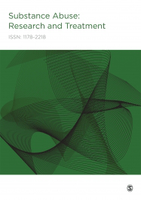
Substance Abuse-Research and Treatment
Transforming research into impactful treatments for substance abuse.Substance Abuse: Research and Treatment is a premier open-access journal published by SAGE Publications Ltd, focusing on the multifaceted aspects of substance use and its impact on mental health. Since its establishment in 2008, this journal has been dedicated to disseminating innovative research findings, case studies, and reviews that enhance understanding and treatment of substance-related disorders. With an impact factor that reflects its standing in the field, currently ranked in the Q2 category of Psychiatry and Mental Health, Substance Abuse: Research and Treatment strives to foster interdisciplinary dialogue among researchers, practitioners, and students. By making its content freely accessible, the journal encourages widespread engagement and application of evidence-based practices to mitigate substance abuse issues. The journal’s diverse global perspectives make it a vital resource for anyone invested in advancing knowledge and improving treatment outcomes in this critical area of public health.

Substance Abuse Treatment Prevention and Policy
Leading the charge in substance abuse treatment and prevention.Substance Abuse Treatment, Prevention, and Policy is a premier open access journal published by BMC, dedicated to advancing the understanding and improvement of substance abuse treatment and prevention strategies. Since its inception in 2006, this journal has established itself as a significant resource in the fields of Health Policy and Psychiatry and Mental Health, proudly maintaining a strong reputation reflected in its 2023 Scopus rankings, which place it in the top quartiles of these categories. With an impactful focus on policy implications and evidence-based practices, the journal's comprehensive coverage supports the sharing of innovative research and perspectives aimed at mitigating substance abuse challenges worldwide. Open access since its launch, it ensures that vital research is readily available to researchers, practitioners, and students alike, facilitating collaboration and discourse in this critical area of public health. Its commitment to high-quality research is underscored by its rankings within the 78th percentile for Health Policy and 66th percentile for Psychiatry and Mental Health, highlighting its influence and relevance in addressing pressing issues in substance misuse.
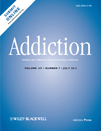
ADDICTION
Leading the way in addiction scholarship since 1993.ADDICTION, published by Wiley, is a highly regarded academic journal that serves the vibrant fields of Medicine and Psychiatry and Mental Health. With an impressive impact factor reflective of its significance—ranking in the top 8% and 7.5% of its categories respectively—this journal is esteemed for its rigorous peer-reviewed research which spans a wide array of topics related to addiction, including pharmacology, prevention, and treatment modalities. Since its inception in 1993, ADDICTION has continually provided a platform for innovative research, shaping the discourse and influencing clinical practices worldwide. This journal, based in the United Kingdom at a prestigious location in Hoboken, NJ, stands as a beacon for researchers, practitioners, and students alike, committed to advancing understanding and strategies to combat addiction-related challenges. Although it is not an Open Access publication, the journal's contribution to the field remains invaluable, ensuring that cutting-edge findings are disseminated widely among professionals dedicated to improving mental health outcomes.

Addiction Science & Clinical Practice
Unlocking the potential of addiction science for all.Addiction Science & Clinical Practice is a premier open-access journal dedicated to advancing the understanding and treatment of addiction through evidence-based research and clinical practice. Published by BMC in the United Kingdom since 2007, this journal has significantly impacted the fields of Clinical Psychology, Medicine, and Psychiatry and Mental Health, proudly securing a Q1 ranking in multiple categories as of 2023. With an emphasis on high-quality research, the journal provides an inclusive platform for the dissemination of innovative findings and clinical insights that address the complexities of addiction. Researchers, practitioners, and students alike benefit from its unrestricted access since 2012, allowing for widespread dissemination of knowledge. Located at CAMPUS, 4 CRINAN ST, LONDON N1 9XW, the journal continues to lead the way in fostering collaboration and informing best practices in addiction science.
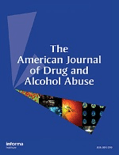
AMERICAN JOURNAL OF DRUG AND ALCOHOL ABUSE
Empowering Scholars with Insights into Addiction DynamicsAmerican Journal of Drug and Alcohol Abuse is a highly regarded publication in the field of substance abuse research, published by Taylor & Francis Inc. With its inception in 1974, this journal has become an essential resource for scholars and practitioners interested in clinical psychology, psychiatry, and the multifaceted issues surrounding drug and alcohol use. It holds a notable Q2 ranking in Clinical Psychology, Medicine (miscellaneous), and Psychiatry and Mental Health, emphasizing its impact and relevance in these domains. The journal's 2023 Scopus rankings further highlight its standing, placing it in the top quartile of publications with established readership and citation metrics. Researchers and students can benefit from its comprehensive articles that delve into the complexities of substance use, treatment methodologies, and the socio-psychological underpinnings of addiction. Whether you seek to access cutting-edge studies or contribute to ongoing discourse in the field, the American Journal of Drug and Alcohol Abuse serves as a vital hub for knowledge dissemination and scholarly engagement.

Journal of Substance Use & Addiction Treatment
Innovating solutions for addiction recovery.Journal of Substance Use & Addiction Treatment is a premier scholarly publication dedicated to advancing the understanding and treatment of substance use disorders and addictive behaviors. Published by Elsevier Science Inc, this journal serves as a vital platform for researchers, clinicians, and students in the fields of psychology, psychiatry, public health, and addiction studies. With its commitment to Open Access, the journal facilitates wide dissemination of cutting-edge research, enabling practitioners and policymakers to access critical findings that inform treatment approaches and public health strategies. As an essential resource in addiction treatment and research, the Journal of Substance Use & Addiction Treatment aims to foster interdisciplinary collaboration and innovation, ultimately improving outcomes for individuals affected by addiction.